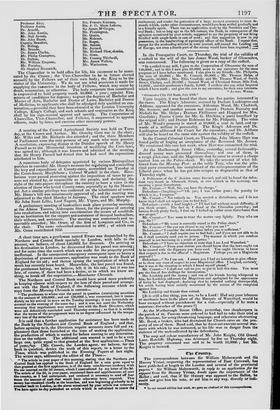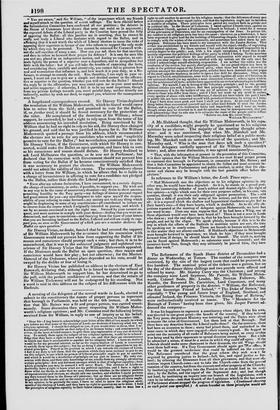elle Country.
The correspondence between Sir William Molesworth and Sir Hussey Vivian, respecting the representation of East Cornwall, has been published at length in the London and several of the provincial papers. Sir William Molesworth, in reply to an application for hie support front Sir Hussey Vivian, dwelt upon the importance of the Ballot ; and said, that if Sir Hussey was opposed to the Ballot, he could not give him his vote, or aid him in any way, directly or indi- rectly.
• In our second edition last week, we gave an abstract of this correspondents,. " You are aware," said Sir William, " of the importance which my friends sod myself attach to the question of tot cret suffrage. The facts elicited before the Intimidation Committee have confii med all our positions ; the debates in Id* House of Commons have' shown that none can resist us in argument ; dur repeated defeats of the Liberal party in the Counties have proved the folly of opposing the Ballot : all this justifies me in asserting, that he cannot be Really and truly a Liberal who hesitates with regard to the Ballot, and in
i
affirming that it s not worth the while of Liberal electors to incur the risks of opposing their superiors in favour of one who refuses to support the only mode by which they cart be protected. You cannot be returned for Cornwall with- out the self-sacrifice of many a one. How can you ask them for that sacrifice, and dare to refuse to foe ward their prayer for defence? It is easy for men like you and me, placed in an independent station, and fearing no superior, to esti- mate lightly the power of a superior over a dependent, and to sympathize but little with the latter : but if you will take the trouble of examining the facts, and considering them carefully and attentively, you cannot fail to perceive how seal and tremendous that influence is, and how much it is your duty, as a Re- former, to attempt to remedy the evil. Ere, therefore I can reply to your re- quest, I must ask you to give me a simple and decided answer in the affirma- tive or negative to the question, whether you will vote for the Ballot ? Should the reply be in the affirmative, you may count upon me as your most zealous and active supporter : if otherwise, I feel it to be my most imperious, though from my private feelings towards you, most painful duty, neither directly nor iodirectly, neither by wish nor deed, to support you, whatever the consequences may be.
A lengthened correspondence ensued. Sir Hussey Vivian deplored the resolution of Sir William Molesworth, which he feared would cause Dim to retire from the field ; and promised to vote for the Ballot, if, on further trial, it should be found necessary for the protection of the voter. He complained of the desertion of Sir William ; whose support, he contended, he had a right to rely upon from the tenor of his address announcing his intended resolution. Being convinced by Sir William that be had no right to rely on his aid, Sir Hussey then changed kis ground, and said that he was justified in hoping for it. Sir William Molesworth quoted a passage from his address, which recommended the electors not to vote for any candidate who would not "explicitly promise to vote for the Ballot ;" but nevertheless, promised to vote for Sir Hussey Vivian, if the Goverment, with which Sir Hussey is con. sleeted, wonld make the Ballot an open question, and leave him to vote as his conscience and reason should dictate. Sir Hussey declined to ask Lord Melbourne the question, as he was not in Parliament, but declared that his connexion with Government should not prevent him from voting for the Ballot if he became conscientiously satisfied that it was necessary to protect the electors. Sir William Molesworth could not admit the validity of this excuse. The correspondence closes with a letter from Sir William, in which he allows that he is liable to a charge of inconsistency in offering to vote fora candidate not pledged to the Ballot, rather than divide the Liberal party "Even after my solemn declaration, I have encountered, to a certain degree, the charge of inconsistency, in order, if possible, to support you. My wish not in ant way to be the cause of unnecessary disunion—my desire to show uncom- promising hostility to the Tory party—my feelings of sincere personal regard and great esteem for you—my unwillingness to take upon myself the respon- sibility of your refusing to come forward—my anxiety not to do any thing which might be displeasing to some of my constituents—all contributed to induce me to swerve from the course which I originally intended to pursue, and which I am by no means convinced is not the right one. Swayed by your earnest re- quest, and most anxious to comply with your desires—finding that you were un- determined, and open to conviction—and fancying from the tenor of your letters that you are becoming inclined to the Ballot, I offered and still am ready to sup- port you, as soon as the Government of which you are a member declares the Ballot an open question."
Sir Hussey Vivian, no doubt, fancied that lie had secured the support of Sir William Molesworth by the afsurance that his connexion with Government would not prevent him from supporting the Ballot if his reason and conscience should prompt such a vote; but then, it is to be remembered, that it was to the unbiassed judgment and unfettered con- science of Sir Hussey Vivian that Sir William Molesworth appealed. If the Ministers made the Ballot an open question, then reason and conscience would have fair play ; but not otherwise ; for the Master. General of the Ordnance, whose place depended on his vote, would be swayed by the dislike or fear of losing it.
Sir Hussey Vivian has published an address to the electors of East Cornwall, declaring that, although he is forced to regret the refusal of Sir William Molesworth to support him, he has determined to go to the poll, with the perfect confidence of success, and that the return of Sir William Trelowney will not be endangered by his standing. Not a word is said in this address on the subject of his differences with the Radicals.



























 Previous page
Previous page